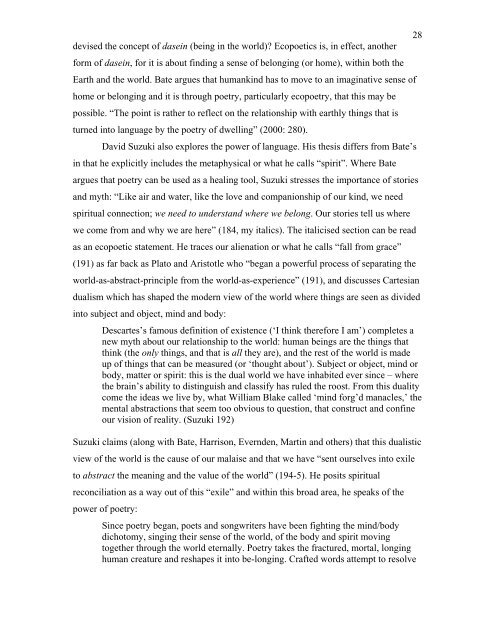"Symbiosis or Death": - Rhodes University
"Symbiosis or Death": - Rhodes University
"Symbiosis or Death": - Rhodes University
Create successful ePaper yourself
Turn your PDF publications into a flip-book with our unique Google optimized e-Paper software.
28<br />
devised the concept of dasein (being in the w<strong>or</strong>ld)? Ecopoetics is, in effect, another<br />
f<strong>or</strong>m of dasein, f<strong>or</strong> it is about finding a sense of belonging (<strong>or</strong> home), within both the<br />
Earth and the w<strong>or</strong>ld. Bate argues that humankind has to move to an imaginative sense of<br />
home <strong>or</strong> belonging and it is through poetry, particularly ecopoetry, that this may be<br />
possible. “The point is rather to reflect on the relationship with earthly things that is<br />
turned into language by the poetry of dwelling” (2000: 280).<br />
David Suzuki also expl<strong>or</strong>es the power of language. His thesis differs from Bate’s<br />
in that he explicitly includes the metaphysical <strong>or</strong> what he calls “spirit”. Where Bate<br />
argues that poetry can be used as a healing tool, Suzuki stresses the imp<strong>or</strong>tance of st<strong>or</strong>ies<br />
and myth: “Like air and water, like the love and companionship of our kind, we need<br />
spiritual connection; we need to understand where we belong. Our st<strong>or</strong>ies tell us where<br />
we come from and why we are here” (184, my italics). The italicised section can be read<br />
as an ecopoetic statement. He traces our alienation <strong>or</strong> what he calls “fall from grace”<br />
(191) as far back as Plato and Aristotle who “began a powerful process of separating the<br />
w<strong>or</strong>ld-as-abstract-principle from the w<strong>or</strong>ld-as-experience” (191), and discusses Cartesian<br />
dualism which has shaped the modern view of the w<strong>or</strong>ld where things are seen as divided<br />
into subject and object, mind and body:<br />
Descartes’s famous definition of existence (‘I think theref<strong>or</strong>e I am’) completes a<br />
new myth about our relationship to the w<strong>or</strong>ld: human beings are the things that<br />
think (the only things, and that is all they are), and the rest of the w<strong>or</strong>ld is made<br />
up of things that can be measured (<strong>or</strong> ‘thought about’). Subject <strong>or</strong> object, mind <strong>or</strong><br />
body, matter <strong>or</strong> spirit: this is the dual w<strong>or</strong>ld we have inhabited ever since – where<br />
the brain’s ability to distinguish and classify has ruled the roost. From this duality<br />
come the ideas we live by, what William Blake called ‘mind f<strong>or</strong>g’d manacles,’ the<br />
mental abstractions that seem too obvious to question, that construct and confine<br />
our vision of reality. (Suzuki 192)<br />
Suzuki claims (along with Bate, Harrison, Evernden, Martin and others) that this dualistic<br />
view of the w<strong>or</strong>ld is the cause of our malaise and that we have “sent ourselves into exile<br />
to abstract the meaning and the value of the w<strong>or</strong>ld” (194-5). He posits spiritual<br />
reconciliation as a way out of this “exile” and within this broad area, he speaks of the<br />
power of poetry:<br />
Since poetry began, poets and songwriters have been fighting the mind/body<br />
dichotomy, singing their sense of the w<strong>or</strong>ld, of the body and spirit moving<br />
together through the w<strong>or</strong>ld eternally. Poetry takes the fractured, m<strong>or</strong>tal, longing<br />
human creature and reshapes it into be-longing. Crafted w<strong>or</strong>ds attempt to resolve

















